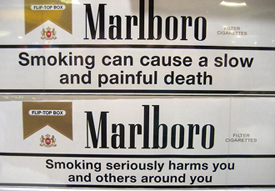Center for Communications, Health and the Environment

The New Face of Tobacco Control in the United States
America has entered a new phase in the fight against tobacco with the 2009 Family Smoking Prevention and Tobacco Control Act. This landmark legislation grants the U.S. Food and Drug Administration (FDA) the authority to regulate both current and new tobacco products, and restrict tobacco product marketing.
 President Obama signed the bill (H.R. 1256/S. 982) into law on June 22, 2009, after the U.S. Congress overwhelmingly approved it by a vote of 79 to 17 in the Senate and 307 to 97 in the House of Representatives. The bill was sponsored by U.S. Reps. Henry Waxman (R-CA) and Todd Platts (R-PA), and the late Senator Edward Kennedy (D-MA). It was endorsed by more than 1,000 public health groups, medical societies and other organizations around the country, including the American Cancer Society Cancer Action Network (ACS CAN), American Heart Association, American Lung Association and the Campaign for Tobacco-Free Kids. Recent surveys also found that 70 percent of American voters supported the legislation.
President Obama signed the bill (H.R. 1256/S. 982) into law on June 22, 2009, after the U.S. Congress overwhelmingly approved it by a vote of 79 to 17 in the Senate and 307 to 97 in the House of Representatives. The bill was sponsored by U.S. Reps. Henry Waxman (R-CA) and Todd Platts (R-PA), and the late Senator Edward Kennedy (D-MA). It was endorsed by more than 1,000 public health groups, medical societies and other organizations around the country, including the American Cancer Society Cancer Action Network (ACS CAN), American Heart Association, American Lung Association and the Campaign for Tobacco-Free Kids. Recent surveys also found that 70 percent of American voters supported the legislation.
In the works for more than a decade, the Family Smoking Prevention and Tobacco Control Act represents the strongest action the federal government has ever taken to reduce tobacco use, the leading preventable cause of death in the United States. Anti-tobacco activists hope that the legislation will end the special protection the tobacco industry has historically enjoyed in the United States and that it will safeguard America’s children, health and longevity by empowering the FDA to take a broad range of unprecedented actions that could significantly reduce the number of people who start using tobacco and considerably increase the number of people who quit using it.
Combatting Tobacco and Its Deadly Effects in India
 Tobacco-control is making headlines – and headway – in India. And CECHE has been there from the get-go.
Tobacco-control is making headlines – and headway – in India. And CECHE has been there from the get-go.
In 2004, CECHE partnered with Indian nonprofit Roshni to launch a Tobacco Control Communications Program in Pattur, a South Indian village near Chennai with a high prevalence of smoking and reliance on tobacco trades. The primary goal of the project was to create an awareness of the health hazards of smoking among the village population and to train selected members, especially women, in skills suitable for non-tobacco trades. Six years in, progress is palatable, with the program providing vocational training and job placement, as well as incentives to refrain from tobacco-related activities and self-help groups to train Pattur families in smoking cessation, nutrition, health and hygiene. Meanwhile, smoking rates in Pattur have plummeted by 60 percent.
[See full CECHE News Article]
Smoking May Increase Flu Risk
Flu season – and the H1N1 pandemic – are upon us, so for those who are thinking of quitting smoking, now may be the time. Because smokers may be more susceptible to the flu than nonsmokers.
According to the Centers for Disease Control and Prevention (CDC), some studies show an increase in influenza infections among smokers compared to nonsmokers. In addition, flu cases are often more severe in people who smoke, and more smokers die from influenza than nonsmokers, the group reports.

Dr. Sushma Palmer, Program Director
Valeska Stupak, Editor & Design Consultant
Shiraz Mahyera, Systems Manager
Daniel Hollingsworth, Website Consultant